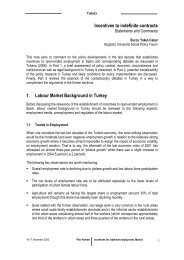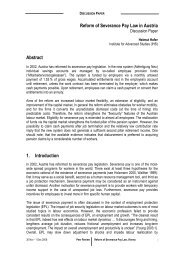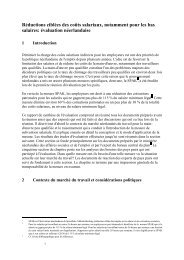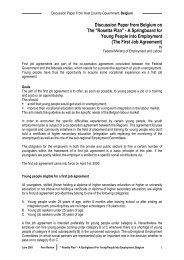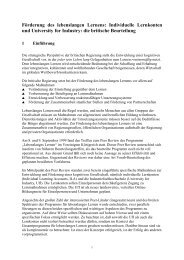Comprehensive strategies for active ageing - mutual learning ...
Comprehensive strategies for active ageing - mutual learning ...
Comprehensive strategies for active ageing - mutual learning ...
You also want an ePaper? Increase the reach of your titles
YUMPU automatically turns print PDFs into web optimized ePapers that Google loves.
SUMMARY<br />
– Adjusting pension systems to discourage early retirement<br />
– Initiatives by the social partners<br />
Conclusions<br />
Jaap de Koning concluded that population <strong>ageing</strong> will almost certainly entail economic problems. Since many of<br />
the effects mentioned above will depend on the behavioural reactions of employers and workers, it is difficult to<br />
predict the extent of these problems. He reiterated the need <strong>for</strong> reducing incentives to early retirement and<br />
raising the incentives to remain in work or return to work among the 50-65 year-olds. He emphasised the need<br />
to complement incentives to employees with incentives to employers to take on or keep on older workers. He<br />
pointed out that empirical evaluations show that <strong>active</strong> labour market measures can also be very effective <strong>for</strong><br />
this age group. Finally, he stated that further research was needed into the interaction between measures and<br />
their unintended side-effects.<br />
4. Country examples – the United Kingdom and the Netherlands<br />
The country examples of the United Kingdom and the Netherlands had the specific aim of complementing the<br />
introductory paper by Jaap de Koning. The UK example focused on the British strategy of extending working life<br />
and the Dutch example concentrated on policies in the Netherlands aimed at improving the financial incentives<br />
<strong>for</strong> workers to retire later and <strong>for</strong> employers to retain older workers.<br />
4.1 The United Kingdom<br />
The UK strategy <strong>for</strong> extending working life was presented by James Elder from the Department <strong>for</strong> Work and<br />
Pensions. Of the 8.8 million people aged between 50 and state pension age 3 , 70.7% are in employment (a high<br />
rate compared with the European average), 2.1% are unemployed, and 27.2% are in<strong>active</strong>. 1.7million of this<br />
group are claiming benefits. A relatively high proportion of those people over 50 in employment are selfemployed.<br />
The evidence suggests that, in Britain, the decision to retire is largely a financial one and one taken<br />
at a household level with couples typically wanting to retire at the same time. There are marked regional<br />
differences in the employment rates of older people between, with the regions traditionally dominated by heavy<br />
industry (e.g. the North-East) have the lowest employment rates <strong>for</strong> people aged 50-plus , and the South-East<br />
and the South-West the highest. James Elder posed the question of why older people have lower than average<br />
employment rates, and argued that like most countries in the EU, the UK had, until recently, a culture of early<br />
retirement, which has only recently begun to be eroded. It is also no longer attr<strong>active</strong> <strong>for</strong> companies to<br />
restructure using early retirement as a tool and it is more difficult <strong>for</strong> workers to claim sickness and incapacity<br />
benefits. Age discrimination is still prevalent and endemic, however, and was described as 'the last sociallytolerated<br />
<strong>for</strong>m of discrimination' in the UK. The caring roles of older workers (e.g. <strong>for</strong> <strong>ageing</strong> parents) should also<br />
not be underestimated as a factor contributing to their lower employment rates.<br />
Research shows that the reasons older people tend to give <strong>for</strong> early labour market exit are ill-health (46%),<br />
redundancy (16%) and to spend time with partner or family (11%). A high proportion do not leave the labour<br />
market through their own wishes, however, and 60% are involuntarily out of work.<br />
The reasons older people give <strong>for</strong> not seeking work are mainly health reasons (50%), because they regard<br />
themselves as retired or because financially they do not need to work (22%), care duties (12%) and inability to<br />
find a job (2%).<br />
3 i.e. 50-64 <strong>for</strong> men and 50-59 <strong>for</strong> women.<br />
20 April 2005 Thematic Review Seminar <strong>Comprehensive</strong> <strong>strategies</strong> <strong>for</strong> <strong>active</strong> <strong>ageing</strong><br />
4



